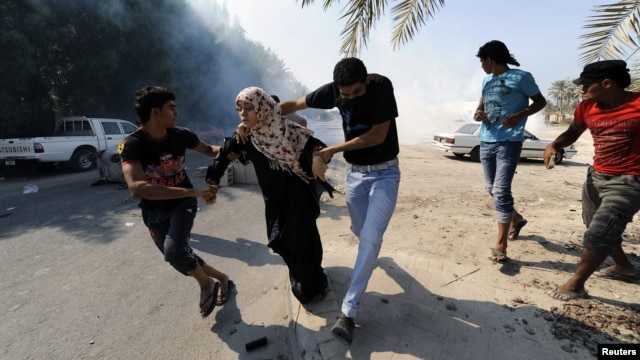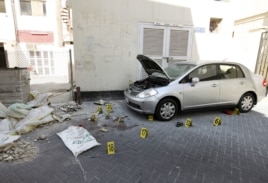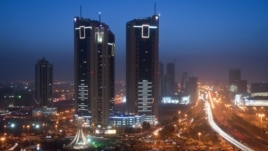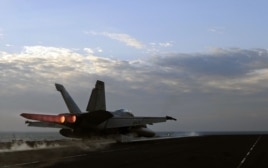Bahrain Unable to Silence Unrest
November 13, 2012
 |
| Anti-government protesters run from tear gas fired by riot police, as they attempt to get to the village of Diraz, west of Manama, November 9, 2012. |
DUBAI — Continuing anti-government activity in Bahrain has shown that the nation’s unrest is far from over, and some analysts say its most violent days are yet to come.
Bahrain has been grappling with an anti-government backlash for 21 months, and clashes between protesters and security forces have become near-nightly occurrences.
Bahrain has been grappling with an anti-government backlash for 21 months, and clashes between protesters and security forces have become near-nightly occurrences.
 |
| Crime scene markers are seen at a bomb site in capital of Manama, Bahrain, November 5, 2012. Five bombs exploded in the heart of Manama Monday, killing two people, officials said. |
In a move heavily criticized by rights groups, the government banned public gatherings after a policeman was killed during a mid-October protest. Less than a week later, five homemade bombs exploded in the capital Manama, killing two foreign workers and seriously wounding another.
No one has claimed responsibility for the attacks, but Bahraini authorities linked them to the Lebanese militant group Hezbollah and said several suspects have been arrested.
While homemade explosives have routinely been used against police by opposition extremists, Michael Stephens, a researcher at RUSI Qatar, said targeting the public is new to the conflict.
"What we’re seeing is a sustained pattern of increasing desperation and violence within the Bahraini community, particularly on the Shi’ite side and that’s coming off the back of a completely stalled and failed reconciliation process," said Stephens.
Bahrain’s majority Shi’ite Muslims took to the streets in February 2011 demanding more rights and political reform from the Sunni monarchy.
No one has claimed responsibility for the attacks, but Bahraini authorities linked them to the Lebanese militant group Hezbollah and said several suspects have been arrested.
While homemade explosives have routinely been used against police by opposition extremists, Michael Stephens, a researcher at RUSI Qatar, said targeting the public is new to the conflict.
"What we’re seeing is a sustained pattern of increasing desperation and violence within the Bahraini community, particularly on the Shi’ite side and that’s coming off the back of a completely stalled and failed reconciliation process," said Stephens.
Bahrain’s majority Shi’ite Muslims took to the streets in February 2011 demanding more rights and political reform from the Sunni monarchy.
 |
| A night view of anti-government demonstrators at Pearl square in Manama, February 22, 2011 |
Troops from Saudi Arabia and the United Arab Emirates were eventually called in to help quell the uprisings and King Hamad bin Isa Al Khalifa declared a three-month state of emergency in March 2011.
An independent inquiry later confirmed the government was guilty of a number of human rights violations including torture.
Authorities have since made limited reforms, but not enough to pacify the opposition, the majority of which promotes peaceful protesting.
According to Stephens, as the stalemate drags on, hardliners are gaining ground. He said, "What you’re going to see, I’m afraid to say, is a worsening of the political situation and I would say that you’ll see some more terrorism as a result of that."
Christian Koch, director of the Gulf Research Center Foundation, said regional concerns have added complexity to the reconciliation process inside Bahrain.
"There is this real fear within the GCC [Gulf Cooperation Council] states that if one makes too many concessions and allows the Shi’ites to gain real power that ultimately all one is doing is opening a door for Iran into the rest of the region," said Koch.
The Bahraini government has accused Shi’ite powerhouse Iran of orchestrating unrest inside the kingdom. Iran and the opposition reject the claims.
An independent inquiry later confirmed the government was guilty of a number of human rights violations including torture.
Authorities have since made limited reforms, but not enough to pacify the opposition, the majority of which promotes peaceful protesting.
According to Stephens, as the stalemate drags on, hardliners are gaining ground. He said, "What you’re going to see, I’m afraid to say, is a worsening of the political situation and I would say that you’ll see some more terrorism as a result of that."
Christian Koch, director of the Gulf Research Center Foundation, said regional concerns have added complexity to the reconciliation process inside Bahrain.
"There is this real fear within the GCC [Gulf Cooperation Council] states that if one makes too many concessions and allows the Shi’ites to gain real power that ultimately all one is doing is opening a door for Iran into the rest of the region," said Koch.
The Bahraini government has accused Shi’ite powerhouse Iran of orchestrating unrest inside the kingdom. Iran and the opposition reject the claims.
Bahrain’s strategic significance is highlighted by the fact that it is home to the U.S. Navy’s 5th Fleet, a bulwark against Iran and any threats to Gulf oil shipments.
As part of its ongoing crackdown on dissent the government last week revoked the citizenships of 31 activists, a move critics say will likely deepen divisions in the county.
Fiona O’Brian, editor of the Gulf States Newsletter, said it is unlikely Bahrain will be able to solve its crisis alone. She said serious engagement by the international community is needed, and this has been lacking until now.
"There has been quite a lot of international criticism of the government, but it has to be said that the criticism hasn’t tended to ever extend beyond the rhetoric," said O'Brian.
Despite expressing concern over the situation in Bahrain, Britain last month signed a defense pact with Manama. In May, the United States agreed to an arms deal with the Bahrainis.
Over the weekend, Bahrain National Guard forces were deployed to different parts of the country to patrol “strategic locations” where anti-government rallies are common.
According to the International Federation for Human Rights, about 80 people have been killed in Bahrain since the anti-government uprising began.
As part of its ongoing crackdown on dissent the government last week revoked the citizenships of 31 activists, a move critics say will likely deepen divisions in the county.
Fiona O’Brian, editor of the Gulf States Newsletter, said it is unlikely Bahrain will be able to solve its crisis alone. She said serious engagement by the international community is needed, and this has been lacking until now.
"There has been quite a lot of international criticism of the government, but it has to be said that the criticism hasn’t tended to ever extend beyond the rhetoric," said O'Brian.
Despite expressing concern over the situation in Bahrain, Britain last month signed a defense pact with Manama. In May, the United States agreed to an arms deal with the Bahrainis.
Over the weekend, Bahrain National Guard forces were deployed to different parts of the country to patrol “strategic locations” where anti-government rallies are common.
According to the International Federation for Human Rights, about 80 people have been killed in Bahrain since the anti-government uprising began.

No comments:
Post a Comment